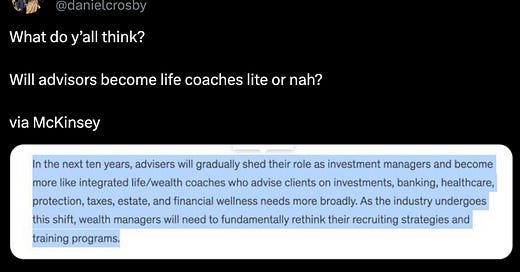Why?: "Are Advisors Becoming Life Coaches?"
The job of a financial advisor is getting harder, and more interesting.
Daniel Crosby, Chief Behavioral Officer at Orion, and host of the Standard Deviations podcast, posed the following question on Twitter yesterday:
Which feels like an almost unfair slow-pitch over center plate for me, given Friday’s post where I highlighted how I think the “why?” questions around wealth are the most interesting ones.
The above quote is particularly interesting, and I though it worth teasing apart:
“… advisers will gradually shed their role as investment managers …”
One of the biggest challenges with the financial advisor “market” is even coming up with a definition. Once upon a time, when trip-hop and grunge were ascendant, the lines were a lot clearer. If you worked for a “wirehouse” — a big brokerage firm or bank like Merrill Lynch, Wells Fargo or UBS — you probably had securities licenses and were basically in the position of selling your firm’s approved list of products to your firm’s clients, in exchange for some sort of commission paid for by customers. If you worked for a regional firm or an independent advisor firm, you probably charged an AUM-based fee on a total portfolio, had alternate credentials instead-of or in-addition-to your licenses.
But both classes of “advisor” were basically in the same business: taking rich people’s money and helping it find a productive home. In the ‘90s when I met a friendly-seeming advisor at a conference I would say “Oh which kind are you? Golf player or asset manager?”
Hands, Wizards & Shamen
These days, the golf player/asset manager spectrum doesn’t apply anymore. Betterment or Wealthfront or any broker-dealer has either a model-portfolio or direct-indexing based robo-advisor that will, if we’re being honest, provide a decent, low-cost, diversified portfolio that will avoid nasty surprises. Heck, the advisor focused Turnkey Asset Management Program (TAMP) business is over $12 trillion already (probably a lot more, but it’s not easy to track).
The industry deeply knows this: the current gold-standard for core advisor training - the CFP designation - has investment management at around 17% of the curriculum at this point - less time than is spent on, say, retirement planning.
This is a good thing! Investing is largely a solved problem. I think the current duopoly of did-the-homework bona fides between the CFP curriculum (which I honestly think mints pretty darn good advisors), and the Chartered Financial Analyst (CFA) designation, which mints hardcore investment nerds, is almost ideal. I’m far too lazy and/or deficient to have gotten either, but I’ve worked with a lot of both over the years, and that sums it up pretty well for me.
So what’s that universe? There are some 100k CFP’s out there, almost 200k CFA charterholders. That’s sort of the big number. It includes all sorts of folks working steady jobs in bank branches, and lifetime advisors who’ve build a practice, and young hustlers all together. Heck almost 60,000 of them subscribe to Kitces.com. (Call that the nerdy-online advisor diagram, of which I consider myself an honorary member).
So just for the sake of argument, let’s use the 100,000 number. That’s 100,000 individuals of questionable but improving diversity (85% white — but better than it used to be! half over 50, but more under 50 than ever! 76% male, but getting less so!) who have one primary job:
Telling rich people what to do.
Hands
Even the least holistic planner on the planet, who simply takes their client’s investable assets from an intake process, consolidates some accounts and shoves the money into a TAMP is still fundamentally telling rich people what to do to grow and maintain their power structure. That’s the baseline. A simply-decent advisor thinks about things their clients don’t think about or don’t have an interest in — like taxes and required minimum distributions and structuring trusts to protect the house — and then use that secret knowledge to coordinate actions. They are the “hands” of their clients, to put it in Game of Thrones Speak.
But where Tyrion Lannister could say “I drink, and I know things” - a decent advisor might say “I play golf, and I know things.” Drinking optional.
Wizards
So are those Hands-of-the-King “Life Coaches?” Not usually. But the ones who cross the line just a little bit end up seeming like Wizards to their clients. A Wizard doesn’t just have secret knowledge, they have secret powers. The first time I heard an advisor walk through how they implemented a 5 year sell-down plan using direct indexing to minimize the taxes and concentration risk for a whale-client, I barely understood what he was talking about. I’m sure the client didn’t. It was pure wizardry.
The higher up the food chain you get the wilder and more arcane the wizardry seems (just listen to Frazer Rice’s “Wealth Actually” podcast for tales from that particular crypt.)
But even the best Wizards — while perhaps providing more complex business-coaching and executive-functioning guidance — don’t actually help the king become any wiser. Wisdom matters because by definition, the high-net-worth’s of the world wield most of the actual power. For better or worse, I suspect very little good gets done at scale in my lifetime without big redirections of capital. But knowing what to do to make a difference — and wanting to make a difference in the first place — requires a different thing. It requires wisdom.
Shamen
If a Good advisor is a wizard who has mastered the power-systems, a great advisor has all of that at their disposal and then asks their client one question, over and over again.
“Why?”
Why all the power? Why all the accumulation? What do you hope to achieve? What’s the point? What’s the long game? What gives you hope?
There are socially acceptable answers to these questions — I know, I ask them all the time when I interview people. “My kids” is a near universal answer, and its a good one. Parenthood is one of the only acceptable meaning-junkets left in Western society. Every measure of life gets worse when you become a parent (health, wealth, sleep, leisure, social connections, you name it) and yet parents still keep parenting, and most of the time when someone says “my kids” I see their face light up and I know that — even through the anxiety — it’s true.
But precisely because “my family” is the only real socially acceptable answer, it has little transformative power. “Family” becomes just another checkbox in the financial advisor relationship: get the trust set up, get the 529’s all funded, decide how much money to leave your kids (or pay them as adults).
A great advisor sees beyond this. Advisors deal with high-performance people all the time — it’s generally why the family is wealthy in the first place, someone did *something* to get all that money. And it takes a certain level of not-giving-a-hoot to challenge your clients when they give you platitudes. Great advisors know that having more money than you need rarely calms anyone’s anxiety, rarely makes “the family” any happier, and is certainly no guarantee of a meaningful life.
Those kinds of conversations require a different level of trust — and weirdness. Like Shamen, great advisors are students of the human condition — of how people function as individuals and how they fit into their communities. They study this in their own lives, and in the lives of those they help. They dwell in the discomfort of “helping the rich stay rich” by helping their clients see the hidden all around them.
These folks — the advisors-as-shamen who live on the edge of the village, speaking uncomfortable truths — are the future of financial advice. And yes, Mr. Crosby, they are in fact “life coaches.”
They exist on every spectrum — from the evangelical Christians praying with their clients, to the Wim Hoff aficionados organizing ice-baths and cave-retreats, to millennial sitting across a kitchen table with a newly minted NFL draftee talking about skipping the sports car investing in their home town.
Some of it’s “woo,” some of it’s therapy, some of it’s just having genuine, eye-contact-heavy human relationships. The Shamen out there are the ones I find most interesting to meet, read, talk to and follow. They’re the ones out there exploring the edges of health and wellbeing and meaning in life, yes, while also being their client’s Wizards and Hands. And because they fill all three roles, they often have an enormous impact on their hyperagent-clients lives, and thus, all our lives.
Should you, constant reader, strive for Shamanhood? Probably not. While I’ve seen the Shamen out there working with their lifelong clients, more often than not asking your client hard questions gets you fired, or your manager worried about your production. It requires a lot of vulnerability, open-mindedness, and often difficult-to-prove economics — few advisor contracts contain a kicker for recommending retreats at a local Zen center, or finders-fees for a lecture series on post-Socratic wisdom practices.
But you Shamen out there are my “Why?” Because when you get it just right, you change the world.








Do you have any shamen job openings?
Interesting piece. The premise is certainly correct ie the investment problem has been solved. This is great news for clients because now they can focus on other ways to increase their net worth. The decision tree splinters into a million pieces at this point bc people are just so diverse in their thoughts, feelings and worldviews. We've tried hard to build a culture of genuine expression so that we can attract people who are truly like-minded. As my Jr advisor would say: "your vibe attracts your tribe"